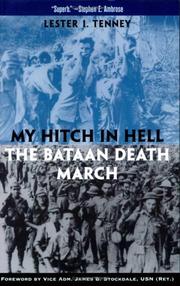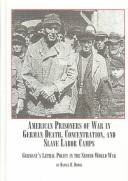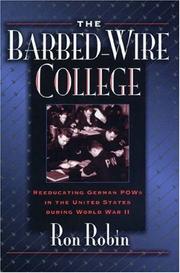| Listing 1 - 5 of 5 |
Sort by
|
Book
Year: 1868 Publisher: Hartford Goodwin
Abstract | Keywords | Export | Availability | Bookmark
 Loading...
Loading...Choose an application
- Reference Manager
- EndNote
- RefWorks (Direct export to RefWorks)

ISBN: 1597973467 9781597973465 1574882988 9781574882988 Year: 2001 Publisher: London Brassey's
Abstract | Keywords | Export | Availability | Bookmark
 Loading...
Loading...Choose an application
- Reference Manager
- EndNote
- RefWorks (Direct export to RefWorks)
My Hitch in Hell is an inspiring survivor's epic about the triumph of human will despite unimaginable human suffering.
Book

ISBN: 1283135825 9786613135827 0833051946 0833050451 9780833051943 9780833051226 0833051229 9780833050458 9781283135825 6613135828 Year: 2011 Publisher: Santa Monica, CA. RAND
Abstract | Keywords | Export | Availability | Bookmark
 Loading...
Loading...Choose an application
- Reference Manager
- EndNote
- RefWorks (Direct export to RefWorks)
This report finds parallels in U.S. prisoner and detainee operations in World War II, Korea, Vietnam, and Iraq: underestimation of the number to be held, hasty scrambling for resources, and inadequate doctrine and policy. Later, attempts to educate and influence prisoners and detainees are often made. The authors recommend that detailed doctrine should be in place prior to detention and that detainees should be interviewed when first detained.
Prisoners of war -- United States -- History. --- United States -- History, Military. --- Prisoners of war --- Iraq War, 2003-2011 --- Vietnam War, 1961-1975 --- Korean War, 1950-1953 --- World War, 1939-1945 --- Military prisons --- Military & Naval Science --- Law, Politics & Government --- Military Administration --- Prisoners and prisons, American --- Prisoners and prisons --- Prisoners and prisons, American. --- Prisoners and prisons. --- European War, 1939-1945 --- Second World War, 1939-1945 --- World War 2, 1939-1945 --- World War II, 1939-1945 --- World War Two, 1939-1945 --- WW II (World War, 1939-1945) --- WWII (World War, 1939-1945) --- Brigs (Prisons) --- Prisons, Military --- History, Modern --- Operation Homecoming, 1973 --- Prisons --- Guardhouses (Military prisons) --- Jails, Military --- Military jails --- Stockades (Military prisons)

ISBN: 077341701X 9780773417014 0773466576 9780773466579 Year: 2003 Publisher: Lewiston : The Edwin Mellen Press,
Abstract | Keywords | Export | Availability | Bookmark
 Loading...
Loading...Choose an application
- Reference Manager
- EndNote
- RefWorks (Direct export to RefWorks)
Using 16 personal interviews, government documents from Germany and the US, the author explores the experience of American POWs who were held in German concentration, death and slave labor camps. The work provides detailed accounts that document the presence of American POWs in these camps, and explores the reasons why the US government systematically suppressed information about them. It affirms that German policy was to kill as many prisoners as possible from all the allied nations, and systematically legalized its actions. It shows that the murder of POWs in death and concentration camps wa
Concentration camp inmates -- Germany. --- Concentration camp inmates -- United States. --- Prisoners of war -- United States. --- World War, 1939-1945 -- Atrocities -- Germany. --- World War, 1939-1945 -- Concentration camps -- Germany. --- World War, 1939-1945 -- Conscript labor -- Germany. --- World War, 1939-1945 -- Prisoners and prisons, German. --- World War, 1939-1945 --- Prisoners of war --- Concentration camp inmates --- History & Archaeology --- History - General --- European War, 1939-1945 --- Second World War, 1939-1945 --- World War 2, 1939-1945 --- World War II, 1939-1945 --- World War Two, 1939-1945 --- WW II (World War, 1939-1945) --- WWII (World War, 1939-1945) --- History, Modern --- Concentration camp prisoners --- Concentration camps --- Prisoners --- Exchange of prisoners of war --- POWs (Prisoners of war) --- War prisoners --- Prisoners and prisons, German --- Conscript labor --- Atrocities --- Inmates --- Nazi concentration camp inmates --- Inmates, Nazi concentration camp --- Nazi concentration camp prisoners --- Nazi concentration camps

ISBN: 1282752189 9786612752186 1400821622 140081314X 0691037000 9781400813148 9780691037004 9781400821624 Year: 1995 Publisher: Princeton, NJ
Abstract | Keywords | Export | Availability | Bookmark
 Loading...
Loading...Choose an application
- Reference Manager
- EndNote
- RefWorks (Direct export to RefWorks)
From Stalag 17 to The Manchurian Candidate, the American media have long been fascinated with stories of American prisoners of war. But few Americans are aware that enemy prisoners of war were incarcerated on our own soil during World War II. In The Barbed-Wire College Ron Robin tells the extraordinary story of the 380,000 German prisoners who filled camps from Rhode Island to Wisconsin, Missouri to New Jersey. Using personal narratives, camp newspapers, and military records, Robin re-creates in arresting detail the attempts of prison officials to mold the daily lives and minds of their prisoners. From 1943 onward, and in spite of the Geneva Convention, prisoners were subjected to an ambitious reeducation program designed to turn them into American-style democrats. Under the direction of the Pentagon, liberal arts professors entered over 500 camps nationwide. Deaf to the advice of their professional rivals, the behavioral scientists, these instructors pushed through a program of arts and humanities that stressed only the positive aspects of American society. Aided by German POW collaborators, American educators censored popular books and films in order to promote democratic humanism and downplay class and race issues, materialism, and wartime heroics. Red-baiting Pentagon officials added their contribution to the program, as well; by the war's end, the curriculum was more concerned with combating the appeals of communism than with eradicating the evils of National Socialism. The reeducation officials neglected to account for one factor: an entrenched German military subculture in the camps, complete with a rigid chain of command and a propensity for murdering "traitors." The result of their neglect was utter failure for the reeducation program. By telling the story of the program's rocky existence, however, Ron Robin shows how this intriguing chapter of military history was tied to two crucial episodes of twentieth- century American history: the battle over the future of American education and the McCarthy-era hysterics that awaited postwar America.
Education, Higher -- United States -- History -- 20th century. --- Education, Humanistic -- United States -- History -- 20th century. --- Prisoners of war -- Germany -- History -- 20th century. --- Prisoners of war -- United States -- History -- 20th century. --- Social sciences -- United States -- History -- 20th century. --- World War, 1939-1945 -- Education and the war. --- World War, 1939-1945 -- Prisoners and prisons, American. --- World War, 1939-1945 -- Psychological aspects. --- World War, 1939-1945 -- United States. --- World War, 1939-1945 --- Prisoners of war --- Education, Higher --- Social sciences --- Education, Humanistic --- History & Archaeology --- History - General --- Prisoners and prisons, American --- Education and the war --- Psychological aspects --- History --- Prisoners and prisons, American. --- Education and the war. --- Psychological aspects. --- Education, Liberal --- Humanistic education --- Liberal arts education --- Liberal education --- Behavioral sciences --- Human sciences --- Sciences, Social --- Social science --- Social studies --- European War, 1939-1945 --- Second World War, 1939-1945 --- World War 2, 1939-1945 --- World War II, 1939-1945 --- World War Two, 1939-1945 --- WW II (World War, 1939-1945) --- WWII (World War, 1939-1945) --- Education --- Classical education --- Civilization --- History, Modern --- Prisoners and prisons [American ] --- United States --- Germany --- 20th century --- Education [Higher ] --- Education [Humanistic ]
| Listing 1 - 5 of 5 |
Sort by
|

 Search
Search Feedback
Feedback About UniCat
About UniCat  Help
Help News
News